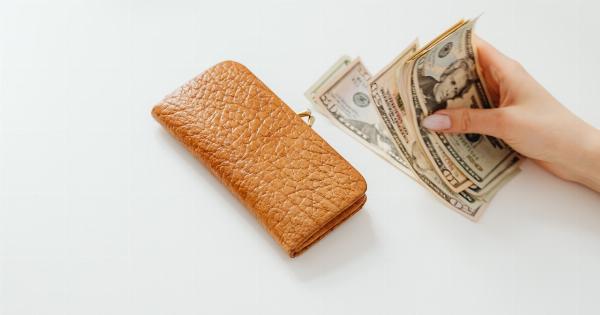For many years, people have carried wallets to hold their money, identification, and other essential items.
However, with the increasing popularity of minimalist lifestyles, some individuals have started to question whether their bulging wallets are doing more harm than good. In this article, we will explore the potential health implications of carrying a bulky wallet and discuss alternative solutions to keep your physical and mental well-being in check.
The hidden dangers of a bulky wallet
Carrying around a fat wallet may seem harmless, but it can actually lead to various health problems over time. Here are some common issues associated with bulky wallets:.
1. Back and spine pain
When you sit with a thick wallet in your back pocket, it creates an imbalance in your pelvis and spine. The misalignment can strain your lower back and lead to chronic pain, which may even radiate to your legs.
Over time, this can cause long-term damage to your posture and overall spinal health.
2. Hip misalignment
Having a bulky wallet on one side of your body can disrupt your natural gait and cause hip misalignment.
This imbalance may affect your balance and stability while walking or participating in physical activities, increasing the risk of injuries, especially in the knees and ankles.
3. Nerve compression
When you sit down with a thick wallet, it exerts pressure on the sciatic nerve that runs through your buttocks and down each leg.
Prolonged compression can result in a condition called sciatica, characterized by pain, numbness, and tingling from the lower back to the feet.
4. Circulation problems
Bulky wallets can impede proper blood circulation when kept in the back pocket. This can manifest as numbness, tingling, or even swelling in the buttocks and legs.
In severe cases, reduced blood flow may contribute to the formation of blood clots (deep vein thrombosis), which can be a potentially life-threatening condition.
5. Damage to credit cards and documents
A fat wallet with numerous cards and documents can subject them to excessive bending, friction, and pressure.
Over time, this can lead to card demagnetization, cracking, and even loss of important IDs or documents, adding further stress and inconvenience to your life.
6. Stress and mental health
Carrying around a heavy wallet can also take a toll on your mental well-being. It can increase stress, as you are constantly worried about the safety and security of your valuable possessions.
Additionally, the sheer weight and bulkiness of the wallet can make you feel burdened and overwhelmed, affecting your overall mood and happiness.
How to minimize the risks?
Now that we are aware of the potential dangers of a bulging wallet, it’s important to make conscious choices to protect our health. Here are some practical tips to minimize the risks:.
1. Streamline your wallet
Regularly declutter your wallet to eliminate unnecessary items such as old receipts, expired cards, or unused memberships.
Consider digitizing loyalty programs and storing essential documents securely online to reduce the number of physical items you need to carry.
2. Opt for a slim or minimalist wallet
Invest in a slim or minimalist wallet that is designed to hold just the essentials. These wallets are sleek, lightweight, and encourage you to carry only what you need, preventing excess pressure on your body.
3. Switch to front pocket carry
Consider switching from back pocket to front pocket carry. Keeping your wallet in the front pocket helps distribute weight more evenly and reduces the strain on your spine, hips, and nerves.
4. Utilize RFID-blocking technology
To protect your credit cards and personal information from electronic theft, opt for a wallet with RFID-blocking capabilities. This technology prevents unauthorized scanning of your cards, ensuring your financial security.
5. Alternate between pockets
If you still prefer keeping your wallet in the back pocket, try alternating sides throughout the day. This will help distribute the load more evenly, preventing prolonged strain on one side of your body.
6. Consider a money clip or card holder
If you primarily use cards instead of cash, you can opt for a money clip or card holder instead of a traditional wallet. These alternatives are compact and lightweight, reducing the strain on your body.
7. Practice good posture
Regardless of how you carry your wallet, maintaining good posture is crucial for minimizing the strain on your back and spine.
Practice proper ergonomics, sit up straight, and perform regular stretching and strengthening exercises to support your core muscles.
Conclusion
While wallets have been an essential accessory for centuries, it’s important to consider the potential health risks associated with carrying a bulky wallet.
By streamlining your wallet, opting for a minimalist design, and adopting healthier habits, you can protect your back, spine, and overall well-being. Remember, it’s not just what’s in your wallet that matters, but also the impact it can have on your health.






























